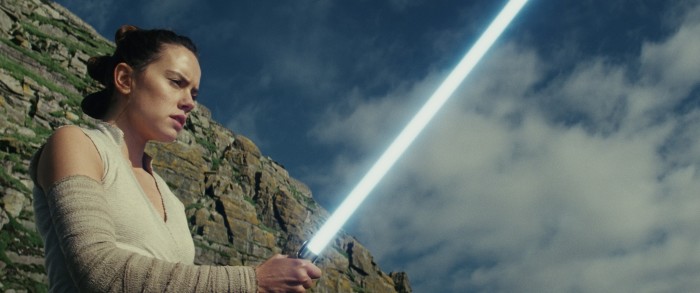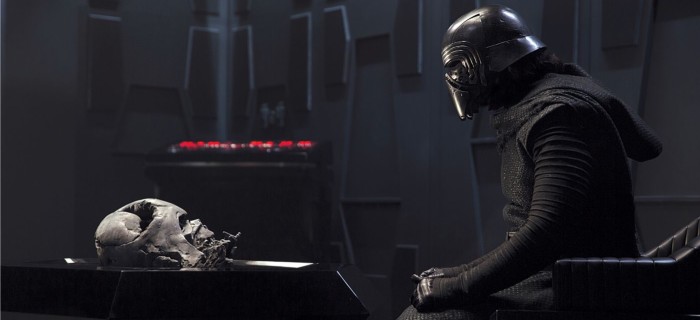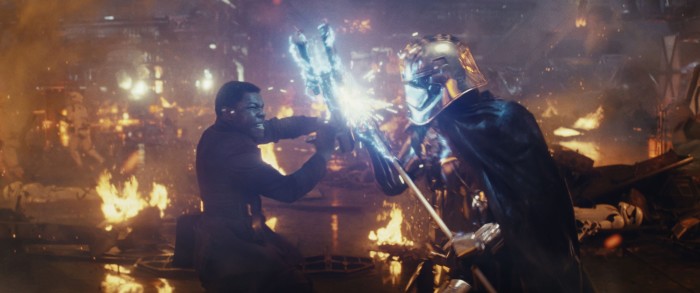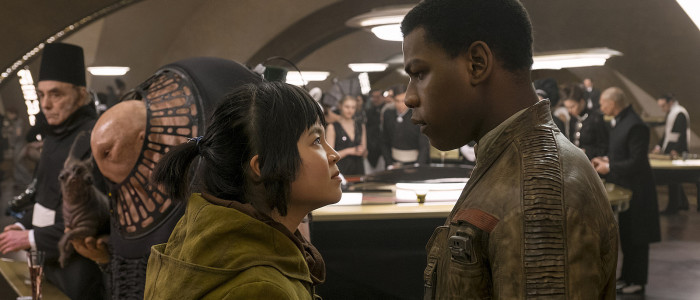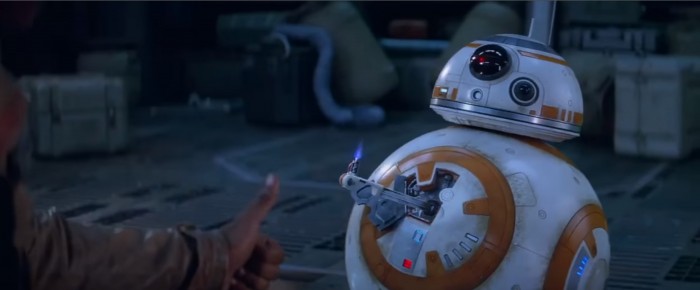Why 'Star Wars: The Force Awakens' Is Better Than 'The Last Jedi'
Since my first viewing of Star Wars: The Last Jedi, I have been Searching My Feelings to determine my definitive stance on the film, but like Kylo Ren, I'm still impossibly conflicted. I gasped during some scenes. I laughed during many scenes. I furrowed my brow during most scenes, including the scenes mentioned above. And throughout the entire movie I was waiting for the other shoe to drop. It didn't, and after a draining two hours and 33 minutes, John Williams's triumphant, end credits fanfare lit up the screen. My primary thought walking out of the Star Wars movie I have been aching for incessantly for two whole years was: What just happened?
By contrast, my immediate reaction to Star Wars: The Force Awakens was unbridled joy and inexpressible love and an unquenchable desire to head back to the theater as soon as possible, as often as possible, to watch the movie again.
Why? It's possible that it all comes down to that fickle friend "expectation." As Anthony Breznican, Entertainment Weekly's resident Star Wars guru (who has undoubtedly been dealing with hordes of, erm, disappointed fans eager to direct their wrath) pointed out on Twitter:
Breznican makes a good point, but the fact of the matter is, a great movie should be able to stand alone and surpass mere "expectation." This idea bothers me because it seems to indicate that diehard Star Wars fans – the ones who reveled in the mysteries of The Force Awakens and dove into discussions online, the ones who scoured the Star Wars comic books for overarching themes, the ones who wrote speculative fanfic, the ones who avoided every interview, article, and promotional material for The Last Jedi so as to maximize their experience when the curtain finally rose on the new film – are doomed to be disappointed. That the excitement and anticipation for the next Star Wars installment ultimately detracts from rather than intensifies the eventual experience. And that if you care about something so much, you're caring about it too much.
There's a fine line between self-aware comedy and satire, and The Last Jedi dips precariously towards the latter. The movie tears fans' hopes and expectations to shreds – and it does so gleefully. My problem with The Last Jedi is not that it subverts the status quo by challenging traditional Star Wars narratives, but that it does this in a way that feels like it's sneering at anyone who actually enjoyed any elements of past movies, including its own predecessor, The Force Awakens. And that's what really grinds my gears. Regardless of who her parents were, Rey is important – to me, to little girls, to female Star Wars fans everywhere – but through misguided humor, cheap dialogue, and a narrative structure that prioritizes certain Skywalkers, The Last Jedi unforgivably downplays her significance, and downplays everything I've come to cherish about J.J. Abrams' addition to the Star Wars canon.
(Full disclosure: From following his interviews and his presence online, I believe that Rian Johnson is a kind and humble human being as well as a passionate and insightful filmmaker. My reaction to The Last Jedi in no way detracts from my respect for him and from what he feels he accomplished. In this situation, I'm attempting to separate the art from the artist.)
Why does everyone want to go back to Jakku?!
As reactions to The Last Jedi filtered in, it became clear that the film was flipping a narrative off-screen as well as on-screen: usually, highly anticipated blockbusters receive a snooty thumbs down from critics and an enthusiastic thumbs up from audiences (see: Batman v. Superman). But The Last Jedi has received overwhelmingly positive reviews from critics and surprisingly negative responses from audiences. There is, obviously, a false dichotomy in play, since many film critics are also enormous Star Wars fans – myself included. But my own personal reaction to The Last Jedi has sent me spiralling towards an existential crisis: intellectually, I appreciate the artistry, the audacity, and the narrative ingenuity of Rian Johnson's film. But emotionally, I was left feeling cold; I liked it, I just didn't love it.
The Force Awakens, on the other hand, is my happy place. I rarely re-watch movies – there are too many out there I haven't already seen – but I gravitate towards The Force Awakens whenever I need a Star Wars-related pick-me-up, and it brings me joy every time. I'm a millennial Star Wars fan, and as such, I grew up on the prequels, not the original trilogy. I was instilled with a healthy amount of respect and even an inherited love for the original films, especially A New Hope, but I was always a prequels girl through and through. Until it became not only trendy to hate the prequels with vicious intensity, but expected. Feeling alienated, I drifted away from the fandom for a while – but then the sequel trilogy was announced, and it was revealed that the newest saga film would be directed and co-written by none other than J.J. Abrams, a filmmaker whose approach to storytelling and commitment to empowered female characters I fervently admire. It was The Force Awakens that got me back into Star Wars, that made me feel like I could claim my place in the fandom. And it was Rey, the first big-screen female Jedi, who took my hand and led me there.
The fact that The Force Awakens is an unabashed remake of A New Hope is actually why I'm so enamored with it. Here, finally, was an "original trilogy" Star Wars movie for my generation, with updated special effects and a glorious display of feminism! I didn't have to embellish adoration for something that was created before my time; I could now appreciate the themes and wonders of that story through a more progressive and more culturally mature lens. After that, it was a quick jump into the world of The Clone Wars, Star Wars Rebels, and the various books and comics released after The Force Awakens.
Then The Last Jedi showed up, jumped into an X-Wing, and blew everything up, impressively managing to piss off fans who deify the original trilogy, fans (like me) who have started to do the same with The Force Awakens, and probably also fans of the prequel trilogy, who just constantly have to deal with shit from everyone.
"We love you!" said fans walking into their opening night showings of The Last Jedi. "I know," The Last Jedi sniggered in response. "And I don't care."
I have a bad feeling about this
After an initial viewing, I expressed the opinion that The Last Jedi simply didn't feel like a Star Wars saga movie. Keyword "feel"; this film is one that prioritizes the head over the heart. It's a message-driven movie rather than a character-driven one, preaching to us through frankly obtuse dialogue about heroism and sacrifice and moral ambiguity. (We get it, you're The Spark™.) But Star Wars is about the people who make up the galaxy far, far away. For example, aside from Rogue One, I don't believe that Star Wars is truly about war – at least, it's not about the precise machinations of battle strategies and the bitter realities of colonialism. It's about good, evil, and whatever's in between. So when Benicio Del Toro's character, DJ, points out to Finn that the elite vacationers at Canto Bight are war profiteers that sell to both sides of the conflict, it feels like a forced Real Life Moral Lesson, not least because it goes in one ear and out the other, and Finn doesn't appear to be remotely conflicted by this information at any point thereafter. If it doesn't affect the character, what's the narrative point?
Abrams is famous for his "Mystery Box" narratives, which keep audiences engaged in the plot but also always, always, reflect back on the characters. Because ultimately, as Abrams has said, "the mystery box is all of us." (Abrams actually uses A New Hope as a prime example in his TED Talk on the subject.)
The Last Jedi, however, contains very few mystery boxes. Instead, it sneers at the puny ideations of our imaginations and smashes Abrams' mystery boxes concept like, well, Kylo Ren's helmet. I happen to appreciate the reveal of Rey's parentage because it does feel true to the character, but every other scintillating question mark from The Force Awakens is callously dismissed. Who were the Knights of Ren? Got any information whatsoever on Supreme Leader Snoke? How about Captain Phasma? What's the story behind how Maz Kanata came to possess Luke's lightsaber? Did Rian Johnson even see The Force Awakens?
For fans who have spent even a spare minute of their lives over the past two years pondering these mysteries – and relishing the delight of the mystery boxes – their treatment at the hands of Johnson feels like a Ben Solo-level betrayal. Certainly, on a personal note, I can't help but feel that I'm being mocked for caring about the answers to these questions – for caring about what came before The Last Jedi in the Star Wars universe at all.
It gets even more difficult to parse the relationship of The Last Jedi to the rest of the franchise when there are AVClub headlines like, "The Last Jedi's best moment is a "fuck you" to George Lucas and J.J. Abrams." Um, what? Why would you ever want to throw a "fuck you" at George Lucas, the genius creator of this whole gonzo enterprise, or at J.J. Abrams, who is, frankly, utterly beyond reproach in all areas of life, except for that Alice Eve incident from Star Trek Into Darkness? Is this really the meta narrative we want to stoke – that each subsequent Star Wars director gets to forge his own way while blithely burning the path behind him?
Since Abrams is credited as an executive producer on The Last Jedi, it's safe to assume that he did have some measure of creative say in the film, though to hear Rian Johnson tell it, Johnson was given free reign by Lucasfilm to do what he liked. Still, the bitterness is tough to swallow. Because it's not just about the fan theories. It's about the cavalier dismissal of any sort of allegiance to The Force Awakens, and the rejection of fan service, which I believe is an integral part of any Star Wars experience.
Laugh it up, fuzzball
Like any storied franchise, Star Wars is steeped in both canonical lore and fan tradition. With references to the ethos of the Jedi Order, the rise of Darth Sidious, and even possible allusions to the Old Republic, The Last Jedi has the former in spades. The latter necessitates certain inclusions in the film that don't necessarily relate to any important element of the narrative, but reflect, meta-narratively speaking, the film's relationship to the franchise and to the fans. For example: every Star Wars movie (assuming the appropriate era) must include R2-D2 and C-3PO, must have someone reference the Millennium Falcon as a piece of junk or garbage, must include a menagerie of aliens in a cantina-like establishment, must have a character utter the line "I have a bad feeling about this," etc. The Last Jedi, to its credit, does include these details (even "I have a bad feeling about this," which you may have missed because it wasn't said in English). So, yes, The Last Jedi checks off a bunch of boxes. But it's still missing the reverence that suffuses nearly every scene in The Force Awakens.
Think: Han Solo saying, "Chewie, we're home," when he steps aboard the Millennium Falcon, and Rey's face when Han mentions Luke Skywalker, whom she thought was "just a myth." Think: Rey summoning and igniting Luke's lightsaber before her fight with Kylo Ren, as the mournful yet hopeful "Burning Farmstead" theme swells in the background. Obviously, The Last Jedi is a very different movie; The Force Awakens was in some sense about building up the mythology of heroes, while The Last Jedi is all about tearing it down. However, because The Last Jedi espouses such a dark theme at its core, the jokes that occur throughout the film come across as darker, too, losing this sense of reverence and veering towards ridicule. BB-8's spunk in The Force Awakens was endearing, but his bizarre ability to ex machina his human friends out of any situation rivals even R2-D2's actions in either of the first two trilogies. And as funny as Luke's "get off my lawn" attitude was, the movie instead should have been focusing more emotional power on the character's guilt and angst.
I'm concerned that Star Wars is heading into Marvel territory, sacrificing emotional resonance and meaningful relationships between characters by peppering its films with barrages of jokes. I enjoyed Thor: Ragnarok immensely, but I felt a prickle of unease when I heard Kathleen Kennedy declare that she'd love to enlist director Taika Waititi for a Star Wars film. Watching Ragnarok, I didn't care that character motivations were hazy and that there was no real narrative tension or danger, because the movie was so damn hilarious. I was content go along with Waititi's irreverent subversion of the superheroes in the film and of the genre itself, because my own identity is not so tightly tied to the Marvel franchise. With Star Wars, though...
The Force Awakens succeeds where The Last Jedi does not, because the humor in TFA is infused with warmth, not scorn. We are invited to laugh with the characters, not at them. Think: every interaction between Han and Finn ("That's not how the Force works!" and "Listen, Big Deal..."), C-3PO being a doofus ("You may not recognize me with my red arm") and a succinct but keen analysis of the reputation of everyone's favorite scruffy-looking nerfherder: "You're Han Solo!" "The Rebellion general?" "No, the smuggler!" Most of the humor works to give us a sense of who these characters are and what they want (or think they want). In short, it feels genuine and true to the narrative.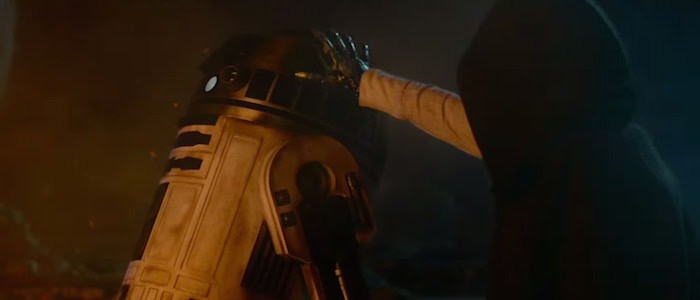
This isn't your story
The Last Jedi is deservedly garnering praise for its gorgeous visual tapestries, but The Force Awakens contains some breathtaking – and deeply symbolic – shots as well, even if they are a bit more understated. (The Last Jedi pretty much shoves our faces in the red-themed imagery; every time someone deliberately scuffed their foot on the surface of Crait, I wanted to shout, "We get it! It's red, like blood!") In TFA, there's the AT-AT half-buried in the sands of Jakku that served as Rey's home, or the Apocalypse Now homage with TIE fighters foregrounding the orange light of an enormous sun. There's the tragic tableaux of two lone figures outlined against the yawning chasm of blackness as Han confronts his son, Ben. And there's Rey's pivotal moment during her fight with Kylo Ren, when she reaches out to the Force and receives some measure of serenity, which is evidenced by the blue shine of her lightsaber replacing Kylo's red. (Thanks for that gem, Ava DuVernay!) And in terms of pure storytelling brilliance, the film's nearly wordless, four-minute sequence introducing us to Rey's character is a work of art all on its own.
These scenes present visual masterpieces that reflect back on the internal journeys of the characters themselves. The Last Jedi is often too concerned with the (literal and figurative) Big Picture to lower itself to the level of the deeply human characters we've come to know and love. With the exception of Kylo Ren, The Last Jedi truly fails its main characters.
Let's start with the person who is supposed to the protagonist of the entire trilogy: Rey. In The Last Jedi, Rey is essentially reduced to a secondary character. I fistpumped my way through the entire lightsaber battle scene in Snoke's throne room, and that should have been the climax of the movie – not Luke's showdown with the First Order. You want to "let the past die"? Don't make Luke Skywalker the titular protagonist of Rey's story! Even though The Force Awakens fixated on the original trilogy character of Han, Han's arc was still only incidental to Rey's. Meanwhile, The Last Jedi is mostly concerned with Luke Skywalker, and Rey's arc is... confusing, to say the least. Why does she suddenly care so much about the Resistance? Why does she suddenly care so much about Kylo?
It's the latter relationship that concerns me – in fact, I was so worried that Rey would be sidelined by a romance plot that I wrote a whole piece about it before the film came out, and it looks like my fears were not unwarranted. In The Last Jedi, Rey and Kylo's interactions are fueled mostly by a contrast of ideals, so I sincerely hope the sexual tension is held in check. And it's great that Kylo is being targeted for the redemption arc treatment, but again, this saga is supposed to center around Rey. I'm thrilled that The Last Jedi turned Kylo into an intriguing villain, but I'm less than happy that it seems to have cost Rey her spotlight.
The humor in the film also undermines Rey's importance. When Rey tries to summon Luke's lightsaber in Snoke's throne room and it whacks her in the side of the head, it's a thoughtless gag that earns a quick laugh at her expense, and at the expense of that immensely powerful lightsaber-summoning moment from The Force Awakens. Even Luke's (admittedly funny) prank on Rey, when he waves some grass at her hand and she assumes she's feeling the Force, had me cringing a bit because of how much it makes her look like a fool. Also, I get that Rey was hit with some pretty intense exposition at various points throughout the film, but did she really need to cry in every other scene? Gone was Rey's prickly "I know how to run without you holding my hand!" from The Force Awakens – in The Last Jedi, we have Rey going on about how she and Kylo "touched hands."
They are the Spark, or something
Though Rey's demotion stings the most, Finn, too, loses much of his charm from The Force Awakens and seemingly is only able to string a sentence together if one of the words in that sentence is "Rey." He vacillates between trying to run away from the Resistance and trying to sacrifice himself for the Resistance. And his Canto Bight caper with Rose merely serves to distract from the other goings on of the film, without paying off in any (positively) significant way for either character or the Resistance at large.
After his absence and presumed death in The Force Awakens, Poe, at least, has a lot more to do in The Last Jedi. And while I love that the movie turns the Han Solo-esque, "trigger-happy flyboy" trope on its side by calling Poe out for singlehandedly decimating the majority of the Resistance's fleet with his impulsive and irrational decisions, the character himself doesn't seem to learn any lesson. Again, this is a case where The Last Jedi foregoes character development for message-mongering, using Poe as a case study instead of treating him like a fully-fledged human.
One way to rectify this would have been to have Poe risk his life rescuing Finn from his suicide mission on Crait instead of Rose. This would demonstrate Poe's growth as a character, showing that he now realizes he shouldn't be risking the lives of others for larger glory. It would also, of course, put Poe and Finn in the romantic situation that was hinted at by their sparkling chemistry in The Force Awakens. I understand the unfortunate reality of the business side of Hollywood, and that the chances of Finn and Poe getting together are small if only because China, the world's second biggest movie market, has banned all content containing homosexuality from its screens. I'm delighted that there are innumerable fans who can now see themselves in a Star Wars film thanks to the remarkable display of diversity in The Last Jedi, but there are still legions of LGBTQ fans who cannot. Don't dismiss the very legitimate despondency of Finn/Poe shippers in the wake of this film's release. We can only hope that Abrams will double down on his declaration that there should absolutely more LGBTQ characters in the Star Wars universe when he directs Episode IX.
Side characters get the shaft too: Laura Dern's Vice Admiral Amilyn Holdo, so quirky and warm in Claudia Gray's Leia: Princess of Alderaan, exhibits barely any personality in barely any screen time in TLJ; Kelly Marie Tran is a treasure and I want to carry her around in my pocket forever, but her character, Rose, is superficial and really only used to spout exposition (and cockblock Finn/Poe). Finally, Benicio Del Toro's DJ is basically just a Lando Calrissian knockoff, Captain Phasma gets the Boba Fett treatment, and Maz Kanata, who was supposed to be the new Yoda, is sidelined and replaced with actual Yoda. (So much for inverting old Star Wars tropes!)
Why are you here?
Why do people love Star Wars? Different people have different reasons that draw them to the screen: some delight in the designs of the different ships and star cruisers, some enjoy the creature creativity, and some – guilty! – go weak in the knees for stunningly intricate, impeccably choreographed lightsaber fights. But as with any good story, the components are secondary to the overarching themes, and as much as Star Wars contains these sci-fi tokens, it is essentially one long story about heroism, hope, and heart. The Last Jedi talked about the first two until it was blue – or red, as it were – in the face, but in its haste to create shock and awe, the film skimped out on the heart. The Force Awakens is certainly not as bombastic as Rian Johnson's film, but it respects the characters, respects the saga, and respects us, the fans. And for that, I'll always love it...and will always be a little skeptical of The Last Jedi.

